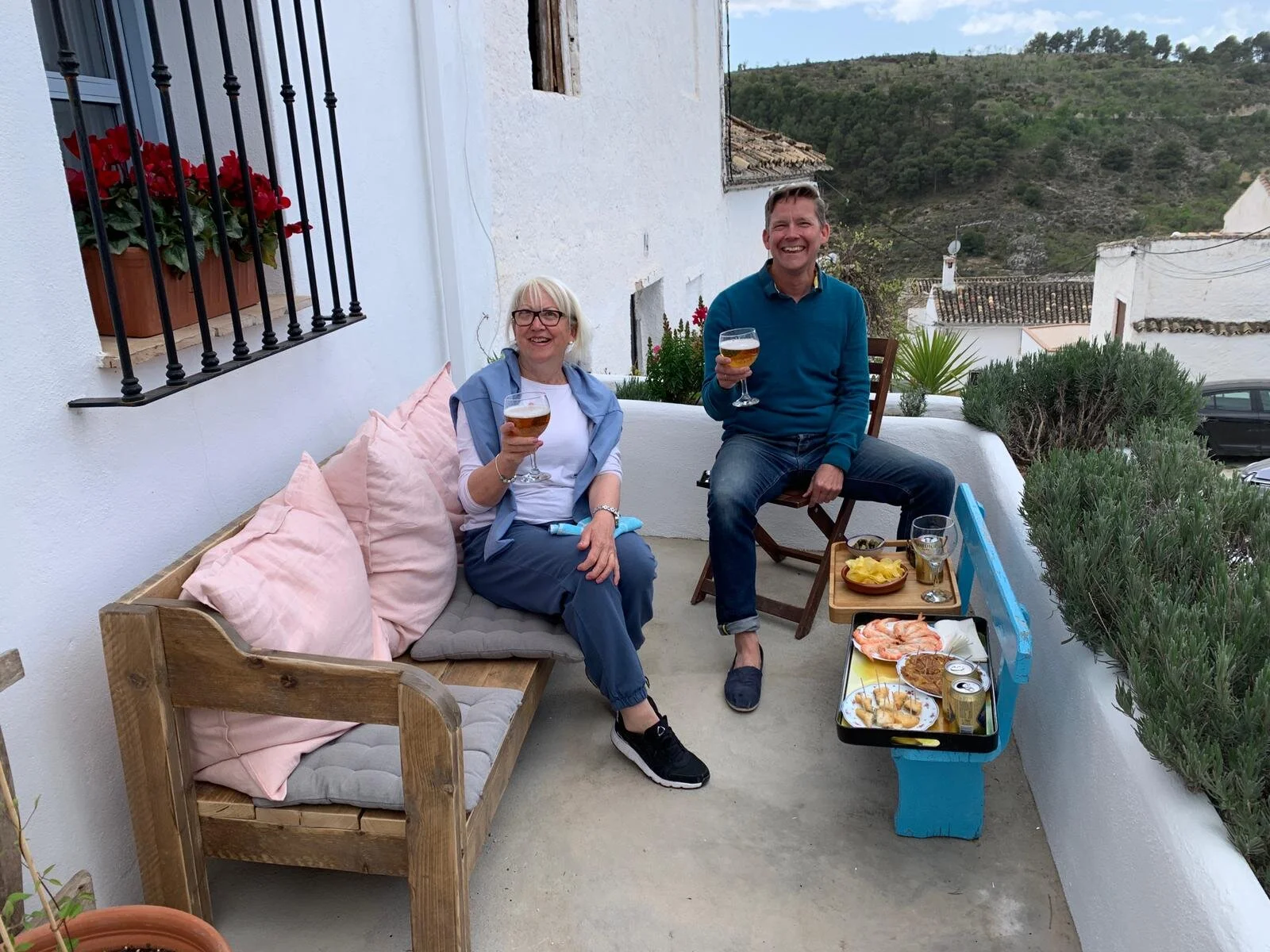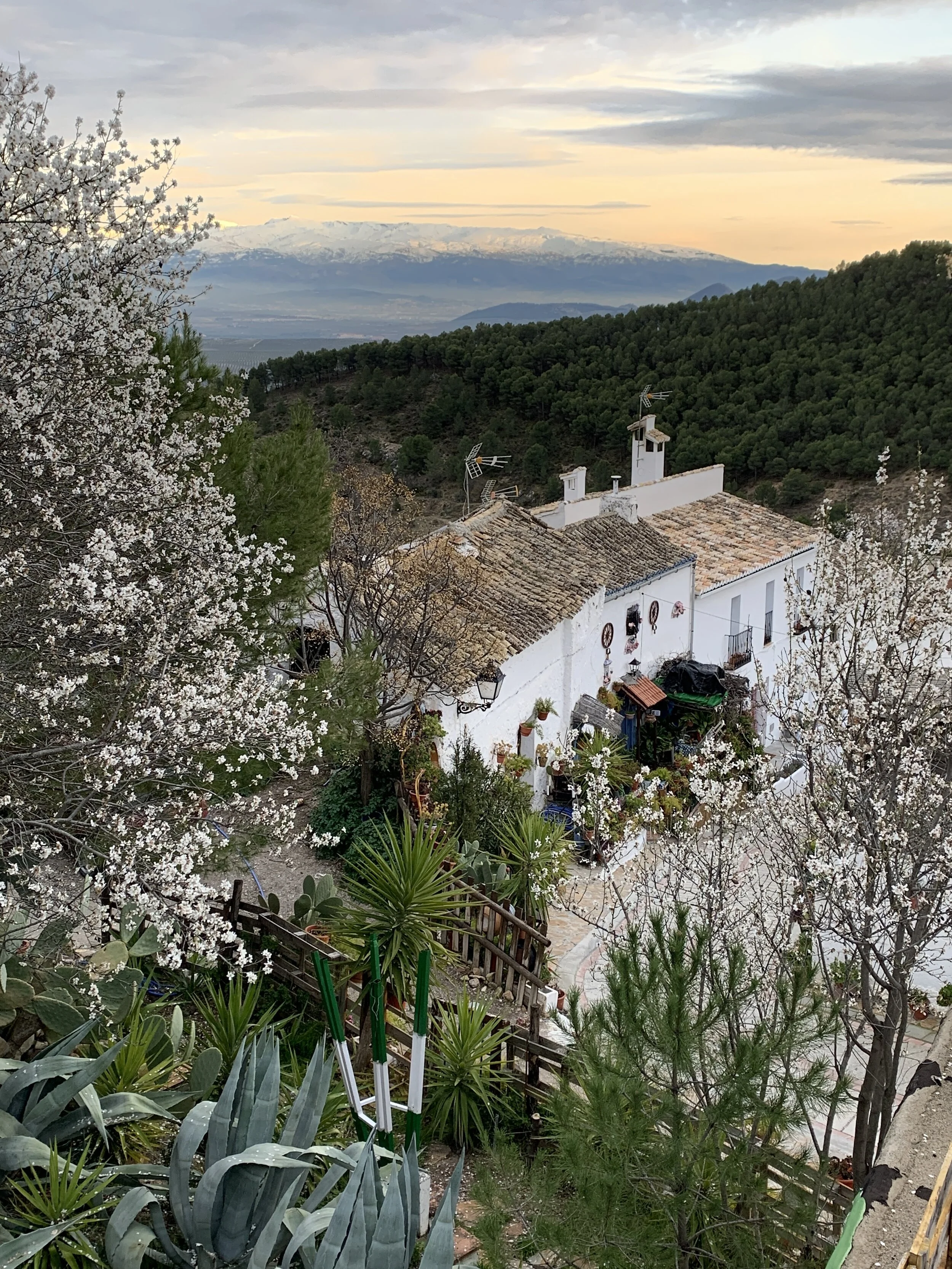Why We Love Spain
Well, it continues to be a tough old time, with one lockdown following another. Last Friday, our latest two-week municipal lockdown came to an end and we are now able to travel around Granada Province one again. Interestingly, with that freedom we actually find it difficult to get too excited, given that we seem to be inured to being confined to our garden and village. We have spent much of the past month working on the garden, landscaping it and filling the rocky beds with plants and shrubs, and we rather enjoy having a bit of time to enjoy the fruits of our labours. The Gin Terrace has certainly seen some use and, as expected, it is worth all the effort of painstakingly laying pebbles to create the terrace when we can sit on our new sofa in the warm embrace of the evening sun, looking across the garden, over the trees and up to the majestic sight of Moclín Castle. I think we all need these moments of peace and quiet to allow us to realise what is important and that, despite the past 12 months, we will not have to live like this forever, and we will get back some of the liberties we so took for granted.
A week or so ago, I was invited by a friend of ours, Manni Coe, to be his guest on one of a series of InstaLive broadcasts on the topic of “Why We Love Spain”. Manni runs an experiential tour company, Toma and Coe, built on his huge passion for, and knowledge of all things Andalucia. What Manni doesn’t know about southern Spain - its culture, history, people, traditions and landscapes - is barely worth taking the time to understand. He also happens to be a charming chap, so chatting to him about our own experiences of Spain was easy.
As you might expect from a chat about loving Spain, the question was posed: “What is it about Spain that you love?”
I went through a list of one or two of the countless reasons why Andrew and I both feel such an affinity for this country, but concluded by acknowledging that we feel a very strong sense of belonging. Interestingly, since that chat, we have been asked other similar questions, and had conversations with other friends about life here, what it means and whether or not we would change anything.
That sense of belonging is possibly the most important aspect of life here. Looking back, Andrew and I both realised that we never really had that sense of belonging when we lived in Bermondsey (London), before we moved to Spain. We had pockets of a life where we felt as if we belonged: the choir, the local pub, a network of cross-London friends, all of which we needed to enhance our lives in the city. However, locally, we never felt as though we belonged. The area in which we lived had a largely transient population. Investors bought properties and rented them out, and the tenants rarely felt the need to put down roots and forge relationships with neighbours. Over our first Christmas in the Bermondsey house, Andrew thought it might be a good idea to invite our immediate neighbours to come for a festive drink one evening. We didn’t get any reply to the invitations and I am not really sure we ever really engaged with any of the other inhabitants of the neighbouring apartments, other than to take in or pick up the occasional Amazon delivery. The house was a base from where we travelled to and from work, and from where we invariably escaped at the weekends for a bike ride, to see friends, have dinner out or take a trip to the cinema or theatre.
Analysing that sense of belonging, or lack thereof, made me realise that I am not sure if I have ever had that sense of belonging in the UK. If I were forced to think of a place that suggested roots, then I would say my happiest times were spent in Suffolk, where my parents had a house. Then again, I only ever saw that home during the school holidays; for 12 week stretches I was shunted off to boarding school in Northern Ireland, and I certainly had no feeling of belonging there! Andrew had a very similar upbringing, shipped off from rural East Sussex to boarding school in Scotland.
My father was in the RAF, so we had a relatively peripatetic lifestyle. I was born in Germany and spent some of my early years in Cyprus, so didn’t have the foundation of a steady home in the United Kingdom. Both Andrew and I have always felt more European than British and, apart from the 2012 Olympics, I am not sure that either of us have felt consumed by waves of patriotism. We both enjoy the culture of continental Europe, the food, the architecture, the music, the diverse landscapes and the diversity of the people.
That brings us back to this sense of belonging and what it is about a place that makes us feel we belong. Before Covid-19, we loved nothing more than having our families and friends come to visit. Indeed, that was one of the fundamental reasons for moving here: to see more of the people we love, for longer. However, this past year, when visits have been all but impossible, other factors have come into play, and these transcend language barriers and differences of culture.
I think we have mentioned before that we have friends here in the village who, by their own admission, really struggle with the Spanish language, despite their best efforts to learn. However, that has certainly not prevented them from becoming an integral part of village life, and they know many more people than we do. They have forged friendships through church, through the local bar, through offering to help with hard work in the countryside, through having an open-door approachability, and this demonstrates that integration and belonging is not just about a shared language. We all agree that it can be frustrating when we can’t always express everything that we would love to say, but there are many other ways to be eloquent.
After my chat with Manni (you can still catch up on these InstaLive broadcasts on Instagram at @tomaandcoe), another friend of ours sent a message. She had listened to the broadcast but had to nip out when questions were invited from the audience, and she wanted to ask if we ever longed for London, particular over the past year with the sadnesses we have experienced. The answer came without hesitation, that we really do not long for London or any other part of the UK. We do long for family and friends, and this has undoubtedly been the hardest part of this whole pandemic. When the family send photos of themselves, and we see our granddaughter growing up with every post, I feel a huge sense of sadness, loss and distance, but have to live in the knowledge that this period is temporary and we will get together very soon.
The connection we had with London becomes more tenuous by the day. My children have both moved out of central London; friends of ours have slowly filtered out and that nucleus that we enjoyed when we lived there has become smaller. We will get our visitors back, and we are counting the days until that happens. The past 12 months will then rapidly become a ghastly memory and we can set about building new, joyous memories.
We had lunch in Granada with friends on Saturday, to celebrate the end of our latest municipal lockdown and we were rather shocked to hear that, as of now, one of them would return to the UK like a shot. The cumulative effect of set-backs had reached a point where the benefits of sorting problems out in a native language, on familiar soil, outweighed the benefits of living here. The ensuing conversation felt a little like looking into a mirror for us both, raising questions that have, I am sure, crossed our own minds from time to time. However, we both unequivocally had to state that we could never see ourselves returning to the country of our nationality. We experience set-backs, like everyone else, but set-backs happen wherever you live. Life is not easy, and there are always challenges to be faced.
However, we took this time to remind ourselves of some of the challenges we face here compared to similar challenges in the UK. Last week, we were advised to go and submit forms to our nearest health centre, just to ensure that we were registered for the Covid-19 vaccine. The process was so straightforward and we were able to get registered for the public healthcare system at the same time (something we have been meaning to do for months!), all in the space of half an hour. I recall, with horror, the appalling service we used to receive at our local health centre in Bermondsey and the time it took to get any sort of appointment.
We’d love to be fluent in Spanish, but we both feel that with a couple more years we will get there. We don’t speak the language every day, which is a hurdle, but with ongoing lessons and conversations with our neighbours and friends, we will get there. Over Easter, we had lunch on our front terrace with our neighbour Mari-Petra, and she told us that the villagers all think we are ‘apañao’ (or apañado), officially translated as useful or resourceful, but in Andalucia it is widely used to describe someone as inherently good or kind. Our neighbours and friends in the village think nothing of telling us they love us, and we love them. We don’t need to be fluent in the language to have that relationship. We know we are lucky to live in such an open, welcoming and generous community and we both know that we have never been happier anywhere else.
It is for all these reasons, and many more, that we love Spain. It’s not a simple thing about preferring one country over another; it is far more complex, and it comes down to that deep emotion of belonging and that sense of connection. Yes, it has been painful and heartbreaking being so far from our family, but this is the place we know is our home. It gives us far more than we take, and it doesn’t take much to remind us why we are here and what it means to us. None of us can predict the future, as the past 12 months have shown in such a spectacular fashion, but the more we live here the more we realise that we would never wish to be anywhere else.
The Gin Terrace in action!








